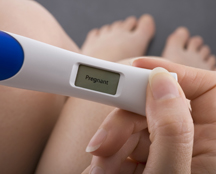Unintended Pregnancy Prevention
 An unintended pregnancy is a pregnancy that is mistimed, unplanned, or unwanted at the time of conception. It is a core concept to better understand the fertility of populations and the unmet need for contraception (birth control) and family planning.
An unintended pregnancy is a pregnancy that is mistimed, unplanned, or unwanted at the time of conception. It is a core concept to better understand the fertility of populations and the unmet need for contraception (birth control) and family planning.
Women of all ages may have unintended pregnancies, but some groups, such as teens, are at a higher risk. A 2011 study reported that 49% of pregnancies in the United States were unintended in 2006, a slight increase from 48% in 2001. Even though the percentage of pregnancies that were unintended declined for teens aged 15–17 years, four out of five pregnancies among women aged 19 years and younger were unintended (Finer 2011, Contraception [PDF - 350KB]). In addition, disparities in unintended pregnancy rates increased, particularly in some subgroups, such as women who were 18–24 years of age, poor, or cohabiting.
The United States has established family planning goals in Healthy People 2020 aimed at improving pregnancy planning, spacing, and preventing unintended pregnancy. An objective is to increase the proportion of pregnancies that are intended to 56%. Family planning efforts that can help reduce unintended pregnancy include increasing access to contraception, particularly to the more effective and longer acting reversible forms of contraception, and increasing correct and consistent use of contraceptive methods overall among those who are sexually active but wish to delay or avoid pregnancy. Research also has focused on better understanding pregnancy intention and how it is measured. As one study suggests, “A better understanding of the multiple dimensions of unintended pregnancy also may lead to a better understanding of the consequences of these pregnancies” (Santelli 2003, The Measurement and Meaning of Unintended Pregnancy [PDF - 112KB]).
Unintended pregnancy is associated with an increased risk of problems for the mom and baby. If a pregnancy is not planned before conception, a woman may not be in optimal health for childbearing. For example, women with an unintended pregnancy could delay prenatal care that may affect the health of the baby. Therefore, it is important for all women of reproductive age to adopt healthy behaviors such as—
- Taking folic acid.
- Maintaining a healthy diet and weight.
- Being physically active regularly.
- Quitting tobacco use.
- Abstaining from alcohol and drugs.
- Talking to your health care provider about screening and proper management of chronic diseases.
- Visiting your health care provider at the recommended scheduled time periods for your age and discuss if or when you are considering becoming pregnant.
- Using effective contraception correctly and consistently if you are sexually active but wish to delay or avoid pregnancy.
Contact Us:
- Centers for Disease Control and Prevention
1600 Clifton Rd
Atlanta, GA 30333 - 800-CDC-INFO
(800-232-4636)
TTY: (888) 232-6348 - New Hours of Operation
8am-8pm ET/Monday-Friday
Closed Holidays - cdcinfo@cdc.gov


